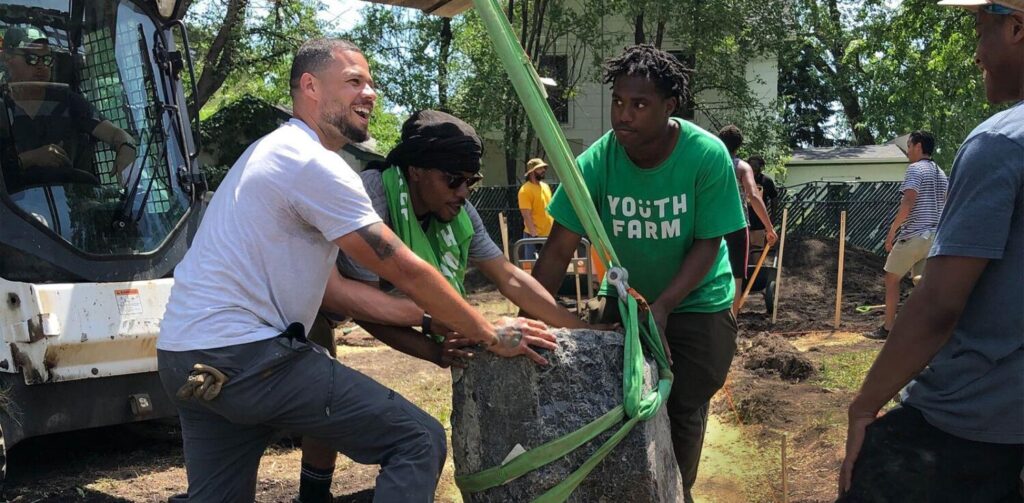Meet some of the Iowans combating climate change, and make your own plan to join the fight
by Chris Espersen, The Cedar Rapids Gazette
Aug. 27, 2023 5:00 am
Photo: Jordan Weber working on a regenerative art project. (Walker Art Museum)

Jordan Weber working on a regenerative art project. (Walker Art Museum)
One of the deadliest fires in U.S. history is occurring in Maui. Hurricanes hitting the coast of … California? Hot-tub-temperature oceans in Florida. Temperatures approachin extremely dangerou levels in Iowa. If you are not worried, you are not paying attention.
It is not just incredibly uncomfortable heat we face in Iowa. Iowans are not immune to climate-related disaster. Derechos, floods, and droughts we have already seen. We cannot wait until the impending devastating impacts of crop destruction, fires, and inability to feed our families. We need to act now.
Jordan Weber is an award winning, internationally recognized regenerative land sculptor and environmental justice activist. His work has taken him across the world, where cities such as New York, Los Angeles, Venice (Italy), Cambridge, Detroit, St. Louis and Minneapolis have sought his talents to create transformative ecological corrections to the landscape. His hometown of Des Moines has yet to benefit from his truly innovative work. In New York, the safety of his daughters and family keeps him up at night. “My dad called about the heat. He lives on the Eastside where there is no tree canopy. He has asthma, diabetes and heart disease, and he is stuck inside because of the heat wave. There are no zones of respite in our neighborhoods.”
Jordan is speaking of the disproportionate impact of climate change on Black and brown neighborhoods. “For me there is no difference between polluting the land and the body — no difference between environmental justice and social justice, they are one and the same. The most oppressed neighborhoods have been pushed into this due to racist urban planning (now face the brunt of climate impacted events).” Floods, lack of natural vegetation and quality soil, and no respite areas are a deadly mix in parts of Des Moines. “Regenerative landscaping itself is key. Less than 0.1 percent of Iowa’s original prairie and wetland remain which act as giant sponges.”
Currently, grants and bank loans to help repair and heal the land are difficult to obtain, even for experts like Jordan who have proved results.
The impact of his environmental art is powerful and self-sustaining. “We started the stormwater treatment rain garden and food sovereignty project before the (George Floyd murder) uprising, and a day after the S. Minneapolis 3rd police precinct was burned to the ground we collectively had our hands in soil to help heal and rejuvenate a vacant lot in a heavily populated neighborhood in North Minneapolis.” Most of his work is in the Midwest, reestablishing natural habitats to pull toxins out of the soil, air and water, and land installation projects to shade vulnerable areas.
We will be benefiting from his regenerative art on a large scale here in Iowa. More to come.
Ed and Kathy Fallon have proved that urban areas can be agricultural havens. “Kathy quit her day job to start a nonprofit, and she saw an opportunity to turn our yard into dinner,” Ed Fallon said.
And it’s much more than dinner. They produce 50 percent of the food they and their guests eat on a tenth of an acre of land. And they teach people how to do the same at their Birds & Bees Urban Farm. “It’s more than the weather that we need to get used to. Crops, food, water supply — will we continue to dedicate to corn, beans and hogs or will we start growing food?”
“What concerns me most is that we still have policymakers who say they understand the urgency of climate change but provide mixed results or don’t push hard enough. Or do things that science tells us don’t make sense. We have empirical and scientific clarity on what is happening — impossible to not see it,” Ed Fallon said.
The couple stresses the need for creative city planning to prepare for possible climate refugees from other areas of the United States — growing edible fruits publicly along rights of way and creating pollinator habitats around the city. “Every place in Iowa needs to do this, we simply cannot rely on the central valley in California for fruits and vegetables.” They also engage in other climate work to push back against fossil fuel development and encourage decentralization of energy production.
Karin Stein is a professional musician and Iowa Organizer for Moms Clean Air Force and EcoMadres and has felt connected to the environment since her days growing up on a farm in the eastern savannah of Colombia. She now lives near Kellogg, and through EcoMadres, she empowers and educates Latino caregivers to take climate action, as Latinos are among the groups in Iowa that are disparately impacted by environmental health issues due to working outdoors and living near heavily polluted areas.
“One example, Muscatine, has some of the worst air pollution in the state,” Karin explained. Entire Latino neighborhoods there experience high disease rates. One family suffers from asthma and heart conditions because of poor air quality from grain processing and coal pollution. Most of their limited budget goes to health concerns. “One of their children has never played outside in snow because of his respiratory issues. Can you even imagine?”
“I am a very positive person, but I ask myself, if I don’t do something to help stabilize the climate, then what am I doing on this planet. What other job is more important?”
Karin understands that most people want to participate but they need to be asked and given simple tools — and her organizations do that well. Whether you want to sign petitions or testify, become a member of Moms Clean Air Force. She is joyful when people who never thought they could talk to legislators make their first visit. “I didn’t know that legislators were people like me.” Karin’s organizations are making voices heard.
Josh Mandelbaum stresses how important those voices are. “There are all sorts of policy changes we can make happen at local level when people advocate. Peoples’ voices makes a big difference.” As a Des Moines City Council member, Josh hears personal stories of the impact of climate related events when is out knocking on doors and in the community.
“There has been a lot of progress in Iowa — we are one of the leading clean energy states in the country. We are diversifying renewable energy with wind, solar and battery power in a way that can be a model for the rest of the country.” Mandelbaum stresses that we need to scale up and take the next step of retirement of fossil fuels, and he handles such cases as an environmental attorney. “What happened in Texas and Maui, knowing that we are not even at the worst of it and watching these events unfold — we are not even predicting how bad things can get.”
There are beneficial economic impacts in multiple layers of the community. “If we implement energy efficiency incentives especially with lower income families it becomes an equity solution — we are all saving energy and (families) are saving money on their bills.” The Inflation Reduction Act has created clean energy and green jobs incentives, which has resulted in the expansion of clean jobs in Des Moines.
Across the state, Iowans can advocate for a 24X7 Carbon Free Electricity Goal similar to the resolution passed by Des Moines City Council Jan. 11, 2021.
Former Sen Rob Hogg has been fighting climate change since the 1980s and is encouraged by the rapid growth of clean energy like solar power. He notes, however, how extraordinarily urgent our current situation is, and how everyone needs to be involved. “People should join an organization, take personal action at home, work, or their community, and then do another thing. They don’t necessarily need to sacrifice a modern life — but we need a lot of change to build a sustainable, prosperous, and healthy future.” He advises those who are interested in solar energy and energy efficiency to look at member organizations of the American Council for an Energy Efficiency Economy
He has taken his climate advocacy from the statehouse to implementing clean energy solutions in his own home and helping nonprofit organizations and places of worship in his area to go solar.“We need leadership by elected officials and the whole of society to try to cut climate pollution — we have to cut greenhouse gases in half by 2030, 65 percent by 2035, 100 percent by 2050 to avoid worst consequences of climate change.”
Rob’s advice? “Find a group to get involved and support, speak up with elected officials.”
The past couple of weeks have been uncomfortable. Life will get even more uncomfortable if we all don’t plug in and push for change — and make changes ourselves.
